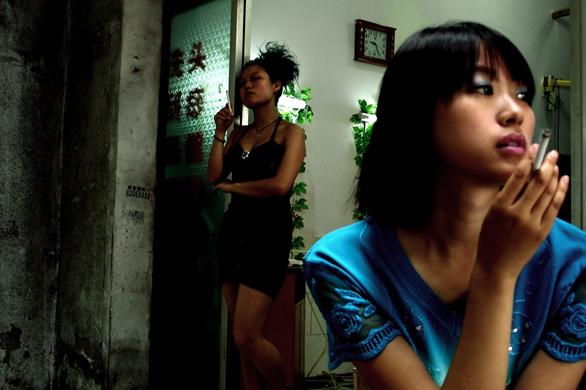“She is Mei, an enigmatic young Chinese woman raised in a backwater but longing for a different life.” This is the basis for Xiaolu Guo’s fairly well anticipated feature film, She, A Chinese. The story follows Mei from her rural Chinese village to a larger city, and then on to London. Unfortunately, this physical journey is not accompanied by any emotional or thematic growth within the film.
From the moment we meet Mei, scowling outside her shack watching youngsters play pool, she is already a bitter and uninspiring character. She starts dating a flashy, motorbike-owning young man from Shenzhen who introduces her to a life of karaoke bars and neon lights; but when she refuses to sleep with him, he dumps her and returns to Shenzhen. This is evidently the catalyst for her decision to leave her village in search of a larger world, but you would never guess it from her response. She remains cold and detached from her surroundings, and we are no closer to empathising with her as a character.
Mei starts spending more time with a burly truck driver, who eventually rapes her. It is at this point that Mei decides to run away to the city. She is fired from her job at a shirt manufacturing factory (although she doesn’t seem to care) and starts working at a hair salon/ brothel. There she falls in love with a gangster, but when he is murdered she uses his secret stash of money to escape to London. Once again, Mei seems almost completely unaffected by these events. I won’t bore you with the rest of the synopsis, but suffice to say she marries an aging Englishman, gets bored of him, moves in with an Indian man who gets her pregnant, runs away again, and ends up on a beach somewhere outside London.
The unavoidable and damning fault in this film is the fact that it is filled with potentially dramatic events and situations that are rendered mundane and nebulous due to the filmmaker and lead actress’s inability to delve into the conflict at the heart of these events. Mei is raped, abused as a worker, marries an old Englishman just so she can stay in Britain, becomes pregnant by a man who runs away, etc. But at no point do these events seem to affect Mei on an emotional level. She remains aloof and detached, and so there is no drama or conflict or emotional growth. The viewer is expected to simply sit and stare at an episodic and meaningless series of events, and this is not a sound or responsible basis for a feature film.
The only interesting thing about this film is it’s partial location in a world that is foreign to most westerners. But no film deserves to be praised purely on the basis of its “exotic” location, as any location would seem interesting to someone who hasn’t been there. Rural China has been represented in a much more interesting way recently in films like ??????, and many of these films also manage to weave a fascinating human story into their representation of specific locales.
There are, perhaps, moments of emotional purity that help to redeem the film. At one point, when her Muslim Indian boyfriend explains that he can’t eat pork because Allah said it was dirty, Mei explains that she washed it in the sink. There are moments like this dotted throughout the film that help us to empathise with Mei slightly, and they fortunately work within the limited emotional range of the fairly stilted and one-dimensional lead actress.
In conclusion, this was a promising film with an intriguing premise. The idea of following a young woman on her journey from a rural Chinese village all the way to London is certainly an interesting idea, and probably accounts for the film’s presence at this festival. But the ways the idea is dealt with – in the creation of the script, the direction of the film, and the performance of the lead actress – fail to create any interesting emotional or thematic premises, and so it remains a dull and uninspiring film throughout.
★★★★★
